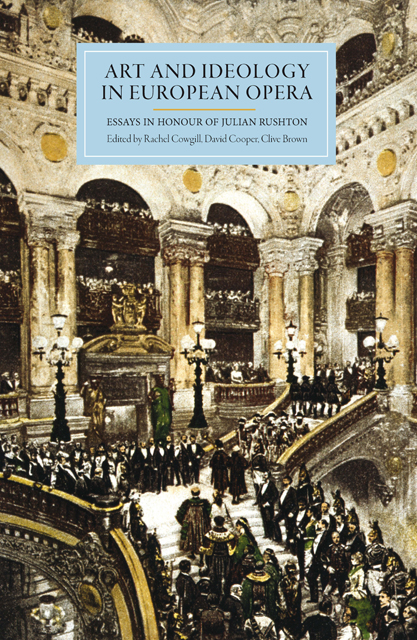Book contents
- Frontmatter
- Contents
- List of Figures
- List of Music Examples
- List of Tables
- Notes on Editors and Contributors
- Acknowledgements
- Introduction
- I Nationalism, Cosmopolitanism and National Opera
- II Opera, Class and the Politics of Enlightenment
- III Opera and Otherness
- Julian Rushton: A Family Memoir
- 7 The Works of Julian Rushton
- Index
- Tabula Gratulatoria
6 - ‘As for opera I am bewildered’: Gustav Holst on the Fringe of European Opera
Published online by Cambridge University Press: 28 February 2023
- Frontmatter
- Contents
- List of Figures
- List of Music Examples
- List of Tables
- Notes on Editors and Contributors
- Acknowledgements
- Introduction
- I Nationalism, Cosmopolitanism and National Opera
- II Opera, Class and the Politics of Enlightenment
- III Opera and Otherness
- Julian Rushton: A Family Memoir
- 7 The Works of Julian Rushton
- Index
- Tabula Gratulatoria
Summary
Although opera occupied an apparently peripheral place in Gustav Holst's compositional work, he expended significant energy during his career on various forms of vocal dramatic art. Even before he enrolled at the Royal College of Music he wrote his first operetta, Lansdown Castle (1892); and very late in his life he composed his mini-chamber-comic-antiquarianopera, The Wandering Scholar (1929–30), thus framing his creative life with forays into music-theatre styles. Critical response, mixed though it was, suggests that his work was admired. However, compared with the vigorous efforts of other composers in England, such as Ethel Smyth and Charles Villiers Stanford, to get their works produced and to establish themselves in the European opera scene,1 Holst seems to have floated along on the fringe of that world. In spite of his active interest in English folk music and the music of Byrd, Purcell and Weelkes, his voice was seldom heard in politicoaesthetic debate concerning the nature and place of English opera at that time. There were, however, at least some composers and directors in England who placed Holst's operas in the mainstream of that debate. It may not be possible to ascertain completely the forces that drove Holst in the directions he chose to follow, yet a look at the development of his musical and operatic thought provides a somewhat telling vignette in the larger history of opera in English.
The effort to establish a native operatic tradition in England with artistic and technical credibility in the latter part of the nineteenth century and the first third of the twentieth, was essentially a struggle against an entrenched Continental tradition of Italian, then German opera. The fight was made more difficult by strict licensing and censorship regulations, including the monopoly of the patent theatres, Drury Lane and Covent Garden, which forced the majority of London venues to gravitate toward operetta and other light musical genres, and led ultimately to a weak infrastructure for serious opera. By the time Gustav Holst went up to study at the RCM in 1893 there had been a number of schemes to develop a serious English opera in London, and his new composition teacher, Stanford, had been actively involved in several.
- Type
- Chapter
- Information
- Art and Ideology in European OperaEssays in Honour of Julian Rushton, pp. 122 - 146Publisher: Boydell & BrewerPrint publication year: 2010
- 1
- Cited by

